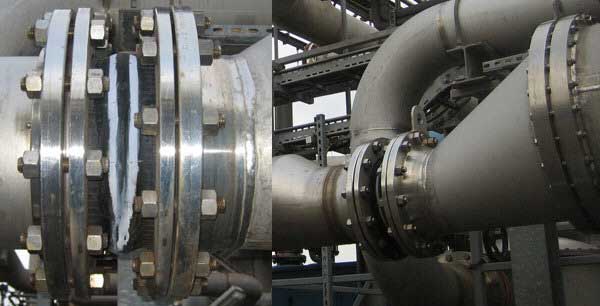Flexible Metal Hoses
Flexible metal hoses are widely used in various industries because of their unique properties and advantages. They are made of metal alloys such as stainless steel, bronze, Inconel etc. which makes them strong, durable and resistant to corrosion and high temperatures.
Benefits of flexible metal hoses
Flexibility
The main advantage of flexible metal hoses is their flexibility. They can bend and twist without
breaking, making them ideal for applications where rigid tubing would not work. This flexibility
also makes installation in tight spaces and around obstacles easier.
Corrosion resistance
Flexible metal hoses are resistant to corrosion, making them suitable for use in applications where
corrosion may be a problem. They are often used in chemical processing plants, the food and beverage
industry and marine applications.
High temperature resistance
Flexible metal hoses can withstand high temperatures, making them suitable for use in high-temperature
applications. They are commonly used in steam and hot water applications and in high-temperature
air and gas applications.
Leakproof
Flexible metal hoses are leak-proof, making them ideal for use in applications where leakage is
unacceptable. They are commonly used in hydraulic and pneumatic systems and in high-pressure gas
and liquid applications.
Durability
Flexible metal hoses are made of high-quality metal alloys, making them strong, durable and resistant
to wear and tear. They can withstand high pressure, extreme temperatures and corrosive environments,
making them suitable for use in harsh environments.
Two types of Flexible Metal Hoses
Corrugated hoses

Ordinary hose cannot withstand longitudinal compressive stress and tends to twist under internal pressure. To resist longitudinal compressive stress and prevent the hose from twisting, corrugated hoses are often made with a braidwork around the outer surface.
A corrugated hose has a long bellow and the braiding protects the corrugated hose from scratches and abrasion. This type of hose is suitable for all types of gases and liquids compatible with the hose material.
Interlocked stripwound hoses

The construction of an interlock stripwound hose consists of links held taut with the packing material. Between these links are slits large enough to accommodate axial movement that gradually closes as the hose is bent.
When the slack closes completely, the hose becomes rigid and cannot be bent further. This sudden stiffness is a warning to the user and prevents the locked hose from bending too far and causing possible damage.
The automatic warning makes this hose ideal for manual use. The outside of the locking hose is relatively smooth, making it easy to handle without any covering.
However, the packaging does not seal perfectly. Therefore, this hose is suitable for conveying air, steam and water under low pressure, but not gases and liquids such as kerosene and alcohol.
End Connections
The ends of a metal hose can be carbon steel or stainless steel, or any other metal that can be welded, brazed or soldered to stainless steel. Some common end connections include NPT, pipe flanges, buttweld fittings, pipe groove (Victaulic) connections.

Applications of Flexible Metal Hoses
Flexible metal hoses are used in many industries and for a variety of applications, including..
Chemical Processing
Flexible metal hoses are often used in chemical processing plants for the transfer of corrosive
chemicals and acids. They are resistant to corrosion, making them suitable for use in harsh chemical
environments.
Food and Beverage
Flexible metal hoses are used in the food and beverage industry to transfer food and liquids. They
are hygienic, easy to clean and corrosion resistant, making them suitable for use in food processing
and storage.
HVAC
Flexible metal hoses are used in heating, ventilation and air conditioning (HVAC) systems to transfer
air and gases. They are resistant to high temperatures and can withstand the pressures and vibrations
of HVAC systems.
Marine
Flexible metal hoses are used in marine applications for the transfer of liquids and gases. They
are resistant to corrosion, high temperatures and pressure, making them suitable for use in marine
environments.
Oil and Gas
Flexible metal hoses are used in the oil and gas industry to transport oil, gas and other fluids.
They can withstand high temperatures and pressures, making them suitable for use in oil and gas
drilling and production.
Conclusion
Flexible metal hoses are an essential component in many industries and applications due to their
unique properties and advantages. They are flexible, durable, corrosion resistant and can withstand
high temperatures and pressures. They are used in chemical processes, food and beverage, HVAC,
marine and oil and gas applications, among others.
Remark(s) of the Author...
Other application for flexible metal hoses
I was involved with a company where every 4 years the entire plant was taken out of service for a maintenance shutdown.
Before all systems could be opened, the plant had to be flushed and emptied as best as possible.
To empty the plant, miles of flexible hoses were used with diameters from 1 inch to 6 inches and lengths of about 10 meters. The installation of all the hoses was started 6 months before the plant went out of operation with about 10 mechanics.
The method of working with the flexible hoses was very effective and saved the prefabrication of kilometers of steel pipes and the risk of misalignment.
A flexible metal hose of course is flexible  .
.
Related Post(s)

Expansion joints are used in piping systems to absorb thermal expansion or terminal movement where the use of expansion loops is undesirable or impractical...